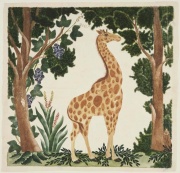Stencil
Description
A strong, rigid, ink resistant sheet of Cardboard or Plastic used to produce a cut-out pattern. The technique of stenciling was used as early as the 8th century in China. Stencils made from sealskins were prepared by the Eskimos prior to Western contact. Mimeograph machines used stencils made of a fibrous paper coated with Wax or Oil. Thin plastic sheets of stencil film made from laminate coated Glassine are also used for commercial stencil printing. Painted stencil, or block-out, designs on fine mesh screens are used to make mass-produced silkscreen prints or unique artist-made serigraphs. Pochoir is the French name for high-quality, often hand painted, stencil designs.
Synonyms and Related Terms
stenciling; stencil board; stencil film; stencil paper; film-stencil; papier stencil (Fr.); pochoir (Fr.); peinture au pochoir (Fr.); Schablone (Deut.); Matrize (Deut.); stampino (It.); plantilla (Esp.); stencil (Ned., It., Sven.); silkscreen; silk screen; serigraphy
Resources and Citations
- Boise Cascade Paper Group, The Paper Handbook, Boise Cascade, Portland OR, 1989
- Encyclopedia Britannica, http://www.britannica.com Comment: "Stenciling." Accessed 29 Apr. 2004.
- Edward Reich, Carlton J. Siegler, Consumer Goods: How to Know and Use Them, American Book Company, New York City, 1937
- Multilingual Glossary for Art Librarians at http://www.ifla.org/VII/s30/pub/mgl.htm
- Art and Architecture Thesaurus Online, https://www.getty.edu/research/tools/vocabulary/aat/, J. Paul Getty Trust, Los Angeles, 2000

